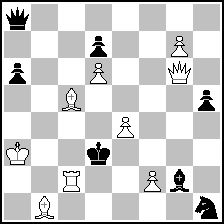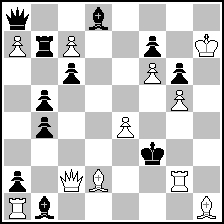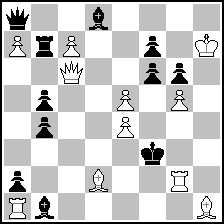|
|
| (1) Posted by Geoff Foster [Tuesday, Apr 12, 2016 00:09] |
Zagoruiko in #2 or #3
The following #2 shows a 4x2 Zagoruiko.
Andrei Lobusov
1 Prize, The Problemist 1976
 (= 9+7 ) (= 9+7 )
#2
1.Qf6? (>2.Qd4)
1...Kxe4 2.Rd2
1...Qxe4 2.Qc3
1...Qd5!
1.Qf7? (>2.Qc4)
1...Kxe4 2.Re2
1...Qxe4 2.Qb3
1...Qg8!
1.Qxh5? (>2.Qe2)
1...Kxe4 2.Rc4
1...Qxe4 2.Qd1
1...Sg3!
1.Qg5! (>2.Qe3)
1...Kxe4 2.Rc3
1...Qxe4 2.Qd2
The following #3 has identical play.
Gerard Smits
1 Prize, Probleemblad 1983
 (= 11+11 ) (= 11+11 )
#3
1.Qxc6! (>2.e5+ Be4 3.Rf1)
1...Rxc7 2.Qd6 (>3.Qf4) Kxe4/Qxe4 3.Rf2/Qg3
1...Rxa7 2.Qxb5 (>3.Qe2) Kxe4/Qxe4 3.Rg4/Qf1
1...Rb6 2.Qc5 (>3.Qe3) Kxe4/Qxe4 3.Rg3/Qf2
1...Rb8 2.Qd7 (>3.Qg4) Kxe4/Qxe4 3.Re2/Qh3.
Both problems were in the FIDE Album. Which setting is better? Which is more difficult to do?
|
|
| (2) Posted by Diyan Kostadinov [Tuesday, Apr 12, 2016 02:41]; edited by Diyan Kostadinov [16-04-12] |
Wonderful problems, thanks for sharing, Geoff!
Both of them are great, but in my opinion the threemover is more complicated and rich. The duel between the bR (with Cross) and the wQ is fantastic! (Even that the wRa1 is not so well used and the key of the twomover is much better)
|
|
| (3) Posted by Darko Šaljić [Tuesday, Apr 12, 2016 06:41]; edited by Darko Šaljić [16-04-12] |
#3 is ok,but Lobusov masterpiece is evergreen! Construction is like from dream, also are black refutations. Look at geometry of WQ 1.move squares and those in mating moves. This is wonderful problem and with only 16 men!!! And basic mechanism is Lobusovs invent, a interduction play i #3 is nice but nothing else.
|
|
| (4) Posted by Miodrag Mladenović [Tuesday, Apr 12, 2016 06:59]; edited by Miodrag Mladenović [16-04-12] |
Both problems are excellent but I prefer #3. Duel between wQ and bR, black Rook cross is great addition. By the way the #3 can be improved by adding wPb3 and removing bPc6. Then the key would be without capturing of black pown.
|
|
| (5) Posted by seetharaman kalyan [Tuesday, Apr 12, 2016 15:18]; edited by seetharaman kalyan [16-04-12] |
Lobusov masterpiece is easier to grasp with obvious tries and a nice key. Despite the similar play in the in-built zagoruijko, Gerard Smits has been very inventive in adding the black rook cross making it a great three-mover. If asked to choose (a difficult choice) I will select the #3. Thanks Geoff for locating these two beautiful problems and sharing it. Misha's improvement is quick and nice!
|
|
| (6) Posted by Nikola Predrag [Tuesday, Apr 12, 2016 18:15] |
1...Ra7 disables 2...Qa7 but corrects that error: 2.Qc5? Ra3!
Therefore I don't understand Misha's improvement.
|
|
| (7) Posted by Miodrag Mladenović [Tuesday, Apr 12, 2016 19:01]; edited by Miodrag Mladenović [16-04-12] |
@Nikola,
You are right. I oversaw a dual after 1...Rxa7 . My mistake.
|
|
| (8) Posted by Miodrag Mladenović [Tuesday, Apr 12, 2016 20:42]; edited by Miodrag Mladenović [16-04-12] |
Here is position with slightly better key (#3)
 (= 11+11 ) (= 11+11 )
#3
Now the wQ is not guarded by black in initial position. 1...Bxc2! is very strong move and it's nice to eliminate it.
|
|
| (9) Posted by seetharaman kalyan [Tuesday, Apr 12, 2016 21:02]; edited by seetharaman kalyan [16-04-12] |
1...Ra7 disables 2...Qa7 but corrects that error: 2.Qc5? Ra3!
Therefore I don't understand Misha's improvement.>>>>
Sorry Nikola. I too missed that 2...Ra3 is disabled by white pawn b3 producing dual.
|
|
| (10) Posted by Nikola Predrag [Wednesday, Apr 13, 2016 02:39]; edited by Nikola Predrag [16-04-13] |
Yes Misha, 1...Bxc2 would obviously destroy white position, so the original key is bad and your 1.exf6 is indeed an improvement.
I would perhaps prefere wQc2 to e8,-bPc6,+wPh2, despite the double guard of g3.
The beauty of the content added to Lobusov's matrix is in the arrival errors of bR.
Anti-dual effects (due to the 2nd-move compensations for the 1st-move errors) 1...Rxa7 2.Qc5? Ra3! and 1...Rxc7 2.Qxb5? Rc4!, make the crucial "ingredient" of the mechanism.
|
|
| (11) Posted by Miodrag Mladenović [Wednesday, Apr 13, 2016 07:17] |
@Nikola
Yes, your version with wPh2 is better improvement. It's nice to avoid capturing of black pown in key move.
|
|
| (12) Posted by Darko Šaljić [Wednesday, Apr 13, 2016 07:35] |
And now try to improve twomover..
Perfection is hardly amusing and everyone like to be amused.
|
|
| (13) Posted by Hauke Reddmann [Friday, Apr 15, 2016 09:56] |
I'm a 2# guy but I prefer the #3 (even if it can be improved)
for a didactic reason: In the 2#, the solver must see the v.
Of course this is no issue in this masterpiece! But imagine
all the far-fetched "modern" stuff with unconvincing v.
In the 3# the solver is forced to find the variations to
solve at all (unless, "1.Qc6, no defense against e5, done" :-)
Hauke
|
|
| (14) Posted by Darko Šaljić [Friday, Apr 15, 2016 11:01]; edited by Darko Šaljić [16-04-16] |
But every twomover with more than one phase can be transformed in single-phase #3 or twins.
In #2 construction is 90% of composition and there is no time to play with basic idea.
|
|
| (15) Posted by Juraj Lörinc [Saturday, Apr 16, 2016 12:22] |
"But every twomover with more than one phase can be transformed in single-phase #3 or twins."
You surely do not mean this literally, many twomovers would not withstand such approach due to construction difficulties.
|
|
| (16) Posted by Darko Šaljić [Saturday, Apr 16, 2016 17:55]; edited by Darko Šaljić [16-04-16] |
I meant that theoretically, one try in #2 can be replaced with white 2nd move in #3.
You're absolutely right when you say that this is not true for every single problem.
|
|
No more posts |
MatPlus.Net  Forum Forum  General General  Zagoruiko in #2 or #3 Zagoruiko in #2 or #3 |
 ISC 2025
ISC 2025 Forum
Forum  General
General  Zagoruiko in #2 or #3
Zagoruiko in #2 or #3 


